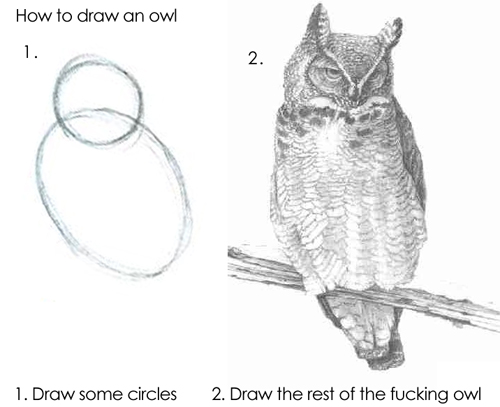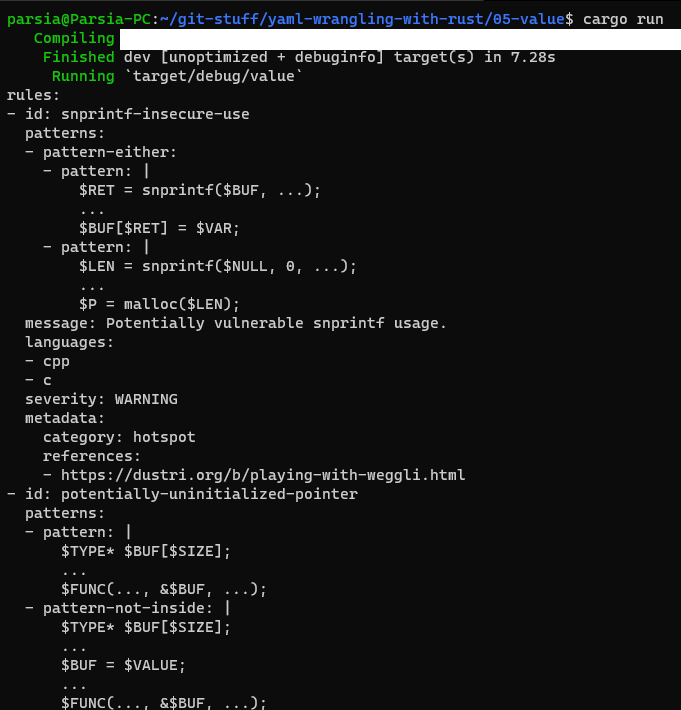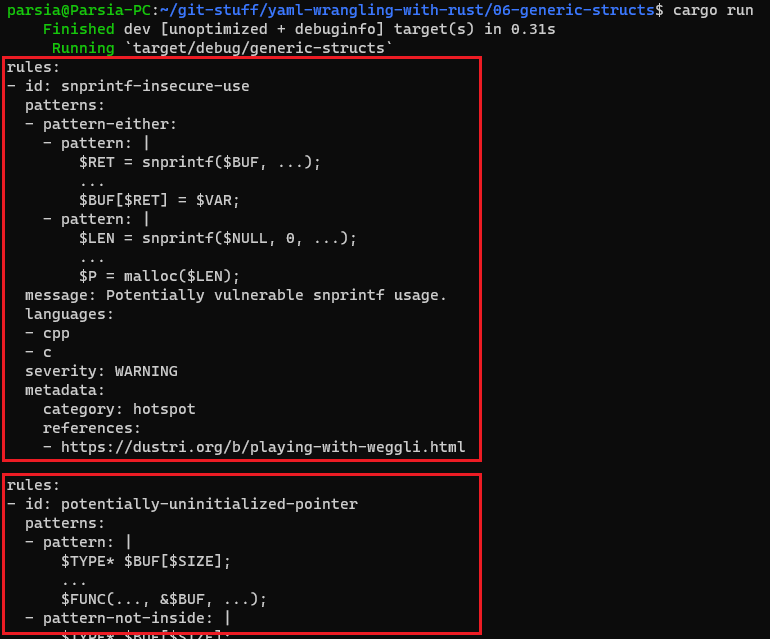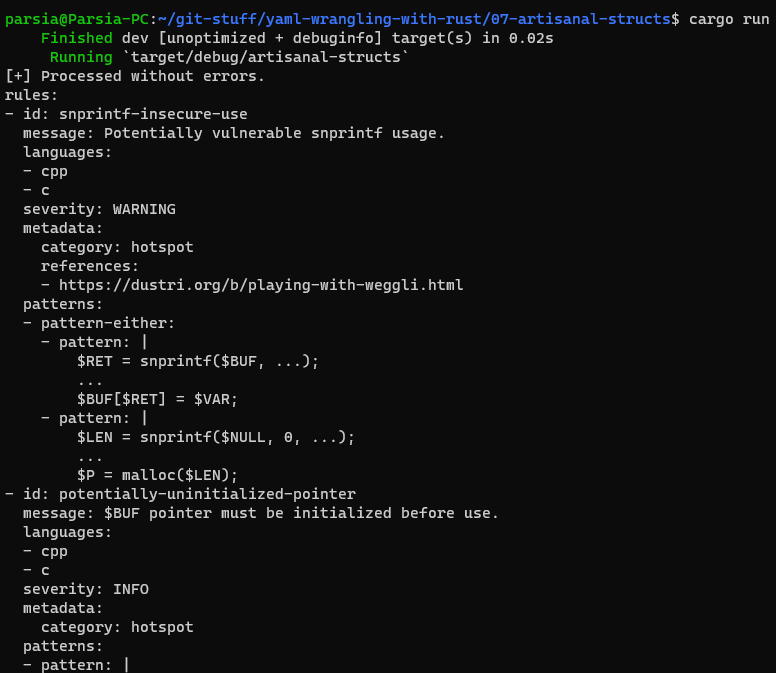
I will talk about how I parsed Semgrep rules in YAML with Rust, how I created Rust structs from JSON schemas for Semgrep rules, and finally, what didn't work. This blog post has different sections with code so you can follow and experiment.
The code is at: https://github.com/parsiya/yaml-wrangling-with-rust.
Choose Your Adventure:
- I am just interested in the Rust structs and sample code to parse Semgrep rules:
- I just want to parse YAML without creating format-specific structs:
- See Generic Rust Structs.
- I want to learn as you did.
- Continue reading.
I have created several cargo crates for this blog. If you want to see sample code or want to follow along, clone the repositories and start editing. I did most of this in a Debian 11 running inside WSL2. Although, it should work on pretty much every system that supports Rust.
Ingredients:
- A recent version of Rust. I used
1.64.0in a Debian 11 distro under WSL2. - Your editor of choice. I am not a real hacker. I use VS Code with the rust-analyzer extension.
- Optional: git to clone the repository.
Getting Started:
- Clone https://github.com/parsiya/yaml-wrangling-with-rust.
cd yaml-wrangling-with-rustwget https://raw.githubusercontent.com/returntocorp/semgrep-interfaces/ee75cb212500f2a57ef5938013a4955a84bb9ab1/rule_schema.yaml
I wanted to learn Rust. I read the book and took some notes. I got bored. Now that I am unemployed and a burden on society, I have more time.
I saw this private Semgrep server a couple of weeks ago and being a Semgrep junkie I want to implement a similar server to learn Rust.
Almost all Semgrep rules are in YAML1. Most files only contain one rule (good practice). A file with one rule looks like:
Files can have several rules; that's how rulesets are implemented:
rules:
- id: rule-1
...
- id: rule-2
...
To have a rule server, I need to interact with these files:
- Extract rules from files with multiple rules.
- Bundle rules together in one file to serve rulesets.
The de facto YAML library in Rust is serde-yaml. Following the examples, I quickly found out I must create proper Rust structs to correctly deserialize Semgrep rules.
fn main() {
let contents = fs::read_to_string("../multiple-rules.yaml")
.expect("Should have been able to read the file");
// let my_yaml: <???> = serde_yaml::from_str::<???>(&contents).unwrap();
}
Every example used a small struct to serialize to YAML and then deserialize back to an object!
 Accurate view of serde_yaml tutorials!
Accurate view of serde_yaml tutorials!
Partial Deserialization
We can haz partial deserialization. Create a few high-level structs and only
capture a few items. Every Semgrep rule must have id and languages. A sample
rule file will look like this:
rules:
- id: rule-1
languages:
- c
- cpp
# the rest of the rule
- id: rule-2
languages:
- rust
# ...
First, I created the struct that holds the complete rule file. The rules tag
contains an array of rules or Vec<Rule> (I haven't created that struct, yet).
Above the struct definition are derive macros that generate implementations
for the struct traits:
Debug: To print the contents of the struct with{:#?}.Serialize/Deserialize: For serialization/deserialization of these structs. See more at https://serde.rs/derive.html.
// 01-first-try/src/main.rs
#[derive(Debug, Serialize, Deserialize)]
struct RuleFile {
rules: Vec<Rule>,
}
What should a Rule look like? I am only looking for two fields:
#[derive(Debug, Serialize, Deserialize)]
struct Rule {
id: String,
languages: Vec<String>,
}
Let's deserialize the test file (it has three of my C++ Semgrep Hot Spot Rules).
// 01-first-try/src/main.rs
fn main() {
// read the file.
let contents = fs::read_to_string("../multiple-rules.yaml")
.expect("Should have been able to read the file");
// don't unwrap like this in the real world! Errors will result in panic!
let rule_file: RuleFile = serde_yaml::from_str::<RuleFile>(&contents).unwrap();
println!("{:#?}", rule_file);
}
The rules are deserialized correctly but I only have access to the defined fields.
:~/yaml-wrangling-with-rust/01-first-try$ cargo run
...
RuleFile {
rules: [
Rule {
id: "snprintf-insecure-use",
languages: [
"cpp",
"c",
],
},
Rule {
id: "potentially-uninitialized-pointer",
languages: [
"cpp",
"c",
],
},
Rule {
id: "memcpy-insecure-use",
languages: [
"cpp",
"c",
],
},
],
}
Let's modify the code and add a dummy required field. Switch to the
02-missing-required-field directory:
// 02-missing-required-field/src/main.rs
#[derive(Debug, Serialize, Deserialize)]
struct Rule {
id: String,
languages: Vec<String>,
// added field
dummy: String,
}
The program panics because the input file doesn't have the dummy tag.
:~/yaml-wrangling-with-rust/02-missing-required-field$ cargo run
...
thread 'main' panicked at 'called `Result::unwrap()` on an `Err` value:
Error("rules[0]: missing field `dummy`", line: 2, column: 3)', src/main.rs:7:75
We can make fields optional by using the Option keyword. This tells the program there might be a string in that field or nothing.
// 02-missing-required-field/src/main.rs
#[derive(Debug, Serialize, Deserialize)]
struct Rule {
id: String,
languages: Vec<String>,
// added field
dummy: Option<String>,
}
Experiments in Creating Rust Structs from JSONSchema
Creating everything by hand is a pain. Manual Work is a Bug2. Luckily, Semgrep rules have a JSON Schema in the semgrep-interfaces repository. I am referencing the line numbers from this version:
A JSON Schema is a way to design and validate JSON
documents3. Earlier I mentioned that every Semgrep rule must have the id
and languages fields. This requirement is on line 160. Each
rule must also have one of those three combinations of pattern fields.
# rule_schema.yaml - line 160
rules:
type: array
items:
type: object
required:
- id
- languages
oneOf:
- required:
- pattern
- required:
- patterns
- required:
- pattern-sources
- pattern-sinks
I found a few solutions to automatically create Rust structs from a JSON Schema. None were successful. But they might be useful for others or future me.
Note about the rule_schema.yaml file. The
semgrep-interfaces repository does not have a license.
I did not know if I could copy it. If you have skipped the Getting Started
section and want to follow the exercises, go and copy the file.
OxideComputer/typify
The typify crate says
The documentation didn't show how to generate code. I used the
example-build/build.rs file.
// 03-typify-generation/src/main.rs
use schemars::schema::Schema;
use typify::{TypeSpace, TypeSpaceSettings};
fn main() {
// read the JSON schema in YAML format.
let content = std::fs::read_to_string("../rule_schema.yaml").unwrap();
// create the schema (this is useful if you want to validate).
let schema = serde_yaml::from_str::<schemars::schema::RootSchema>(&content).unwrap();
// I have no idea what's happening here.
let mut type_space = TypeSpace::new(TypeSpaceSettings::default().with_struct_builder(true));
// panic happens here!
type_space.add_ref_types(schema.definitions).unwrap();
// removed
}
Well, we got a panic!
thread 'main' panicked at 'not yet implemented',
/home/parsia/.cargo/registry/src/github.com-1ecc6299db9ec823/typify-impl-0.0.10/src/convert.rs:31:36
note: run with `RUST_BACKTRACE=1` environment variable to display a backtrace
Adding all the definitions from the schema causes the program to panic. Let's leave debugging for another day (you're welcome to figure it out).
Marwes/schemafy_lib
I found this library in json-schema.org/Code generation. The schemafy_lib docs has a straightforward code generation example.
// 04-schemafy-generation/src/main.rs
fn main() {
let content = std::fs::read_to_string("../rule_schema.yaml").unwrap();
let schema = serde_yaml::from_str(&content).unwrap();
use schemafy_lib::Expander;
let mut expander = Expander::new(
Some("Schema"),
"::schemafy_core::",
&schema,
);
let code = expander.expand(&schema);
println!("{}", code.to_string());
}
No panic but we only get two empty structs. Oh, well!
#[derive (Clone , PartialEq , Debug , Default , Deserialize , Serialize)]
pub struct SchemaItemRules { }
#[derive (Clone , PartialEq , Debug , Default , Deserialize , Serialize)]
pub struct Schema {
#[serde (skip_serializing_if = "Option::is_none")]
pub rules : Option<Vec<SchemaItemRules>>
}
Other Code Generation Methods
There are a few more suggestions on the code generation page. I tried:
- quicktype.io didn't work.
- jtd-codegen is for
JSON Type Definitionsand not schemas. - Generated Java/TypeScript classes (I didn't check them for validity) with tryjsonschematypes.appspot.com. Conversion to Rust structs didn't work.
Using serde_yaml Value
We can also use serde_yaml::Value to parse YAML files without deserializing them into detailed structs. This is very useful if you just want to modify YAML files. For example, just splitting the Semgrep rules in a file.
It took me a bit to figure it out. Value is a container that holds different
YAML objects. Note, I am reading a rule file, again, and not the schema.
// 05-value/src/main.rs - section 1
fn main() {
let content = std::fs::read_to_string("../multiple-rules.yaml").unwrap();
// ----- start of section 1
use serde_yaml::Value;
// read the file and store it in a `Value`.
let rule_file = serde_yaml::from_str::<Value>(&content).unwrap();
println!("{:#?}", rule_file);
// ----- end of section 1
}
This gives us good info.
Mapping {
"rules": Sequence [
Mapping {
"id": String("snprintf-insecure-use"),
"message": String("Potentially vulnerable snprintf usage."),
"languages": Sequence [
String("cpp"),
String("c"),
],
"severity": String("WARNING"),
"metadata": Mapping {
"category": String("hotspot"),
"references": Sequence [
String("https://dustri.org/b/playing-with-weggli.html"),
],
},
// some items removed
},
Mapping {
"id": String("potentially-uninitialized-pointer"),
// removed
},
Mapping {
"id": String("memcpy-insecure-use"),
// removed
},
],
}
Some YAML to Rust patterns:
I can also convert it back to a YAML string. Comment the section 1 code
and uncomment section 2.
// 05-value/src/main.rs - section 2
fn main() {
let content = std::fs::read_to_string("../multiple-rules.yaml").unwrap();
// ----- start of section 2
use serde_yaml::Value;
let rule_file = serde_yaml::from_str::<Value>(&content).unwrap();
// convert it back to a YAML string.
let back_to_yaml = serde_yaml::to_string::<Value>(&rule_file).unwrap();
println!("{}", back_to_yaml);
// ----- end of section 2
}
And I got the same file back.
 The rule file converted back to a YAML string
The rule file converted back to a YAML string
Time to extract info from the YAML files. rule_file is a Mapping and has a
field named rules. rules is a Sequence and has one or more items. Each
item is a single rule in another Mapping and has a string id.
Comment section 2 and uncomment section 3, then run cargo run.
// 05-value/src/main.rs - section 3
fn main() {
let content = std::fs::read_to_string("../multiple-rules.yaml").unwrap();
// ----- start of section 3
use serde_yaml::{Mapping};
// get the file as a mapping.
let rule_file_mapping: Mapping = serde_yaml::from_str::<Mapping>(&content).unwrap();
// we know "rules" is a Sequence so we get it.
let rules = rule_file_mapping.get("rules").unwrap().as_sequence().unwrap();
// go through the rules.
for rule in rules {
// we know the "id" of each rule is a String.
println!("{}", rule.get("id").unwrap().as_str().unwrap());
}
// ----- end of section 3
}
I am doing a lot of unwraps which are not safe!
:~/yaml-wrangling-with-rust/05-value$ cargo run
snprintf-insecure-use
potentially-uninitialized-pointer
memcpy-insecure-use
This method is great if you only want to extract specific parts of the file and treat the rest like a blob.
Generic Rust Structs
Now, I can create some generic Rust structs for splitting the files. The rule
file is an object with one field named rules. rules is an array of rules
(type Mapping).
// This allows us to split the rules without caring about their contents.
#[derive(Debug, Serialize, Deserialize)]
struct GenericRuleFile {
rules: Vec<serde_yaml::Mapping>,
}
Open cargo.toml to see how I've added serde's derive feature.
# removed
[dependencies]
serde = {version = "1.0", features = ["derive"]}
serde_yaml = "0.9"
Now, I can use the struct to split files with multiples rules. For each rule, I
am creating a new GenericRuleFile to create a separate rule file.
// 06-generic-structs/src/main.rs
fn main() {
let content = std::fs::read_to_string("../multiple-rules.yaml").unwrap();
// deserialize
let generic_rule_file: GenericRuleFile = serde_yaml::from_str(&content).unwrap();
// go through each rule. Each one is a Mapping.
for single_rule in generic_rule_file.rules {
// create a new GenericRuleFile object with only one rule.
let mut new_rules: Vec<serde_yaml::Mapping> = Vec::new();
new_rules.push(single_rule);
let new_generic_rule = GenericRuleFile{
rules: new_rules,
};
// convert it to yaml.
let single_rule_yaml: String = serde_yaml::to_string(&new_generic_rule).unwrap();
// print it.
println!("{}", single_rule_yaml);
}
}
 Separated rules
Separated rules
Artisanal Handcrafted Rust Structs!
But that didn't cut it, I wanted more control. To get started, I pasted some rules into jsonformatter.org/yaml-to-rust. Surprisingly, it wasn't that hard.
Some general tips (more in the examples):
- Find the definition of an item by searching the schema for
tagname:. It should have thetype:tag on the next line. E.g.,pattern-either:. type: object=> struct.properties:=> struct fields.array=>Vec.required:=> UseTinstead ofOption<T>(or don't, we're not here to validate).$ref: something=>points to another struct.- Don't define Rust enums unless you have YAML enums (they start with
!).
Note I am not trying to validate rules here. I care about some required fields, but I think it's just easier to use the schema for validation before deserialization.
RuleFile
Let's learn through some examples. The top object is defined at the bottom of
the file starting from line 430. Searching for rules: I can find the start of
the document object.
# rule_schema.yaml - line 430
type: object
properties:
rules:
type: array
This is the complete file or RuleFile. It has an array of Rules in the tag
rules:.
#[derive(Debug, Serialize, Deserialize)]
pub struct RuleFile {
rules: Vec<Rule>,
}
Rule
Rule is more complicated. Find it fields under the properties: tag for
rules: (line 436):
# rule_schema.yaml - line 436
properties:
rules:
type: array
items:
type: object
properties: # <--- HERE
id:
$ref: "#/$defs/id"
version:
title: Version of rule
type: string
message:
title: Description to attach to findings
type: string
# removed
The id field which is of type id. Line 427 has the definition:
# rule_schema.yaml - line 427
id:
title: Rule ID to attach to findings
type: string
There's no need to create a struct for id because String is a Rust primitive
type and it has no other members. version and message are strings, too. I
can create the first three fields:
#[derive(Debug, Serialize, Deserialize)]
pub struct Rule {
// Rule ID to attach to findings
id: String,
// Version of rule
version: Option<String>,
// Description to attach to findings
message: Option<String>,
}
Note how version and message are Options. These are not required tags and
might not be present in every rule.
Although mode is an enum, we cannot define it as an enum here. If so, serde
will look for a YAML enum (they start with !).
# rule_schema.yaml - line 445
mode:
default: search
enum:
- search
- taint
- join
- extract
I defined it as a normal string.
#[derive(Debug, Serialize, Deserialize)]
pub struct Rule {
// removed
mode: Option<String>,
}
languages is another required field and an array of strings.
# rule_schema.yaml - line 452
languages:
title: Languages this pattern should run on
type: array
items:
type: string
It becomes a Vec<String>:
#[derive(Debug, Serialize, Deserialize)]
pub struct Rule {
// removed
// Languages this pattern should run on
languages: Vec<String>,
}
paths is another struct:
# rule_schema.yaml - line 458
paths:
title: Path globs this pattern should run on
type: object
properties:
include:
$ref: "#/$defs/path-array"
exclude:
$ref: "#/$defs/path-array"
additionalProperties: false
The struct has two fields include and exclude. Both are of type
path-array. Search for path-array: in the schema (don't forget the colon) to
find the definition:
# rule_schema.yaml - line 423
path-array:
type: array
items:
type: string
It's just a Vec<String>:
#[derive(Debug, Serialize, Deserialize)]
pub struct Paths {
include: Option<Vec<String>>,
exclude: Option<Vec<String>>,
}
Adding the paths field to Rule:
#[derive(Debug, Serialize, Deserialize)]
pub struct Rule {
// removed
// Path globs this pattern should run on
paths: Option<Paths>,
}
severity is another text enum.
# rule_schema.yaml - line 467
severity:
title: Severity to report alongside this finding
enum:
- ERROR
- WARNING
- INFO
- INVENTORY
- EXPERIMENT
Another ordinary string:
#[derive(Debug, Serialize, Deserialize)]
pub struct Rule {
// removed
// Severity to report alongside this finding
severity: Option<String>,
}
fix-regex
Skipping a few fields to use fix-regex (line 487) as a good example:
# rule_schema.yaml - line 487
fix-regex:
type: object
title: Replacement regex to fix matched code.
properties:
count:
title: Replace up to this many regex matches
type: integer
regex:
title: Regular expression to find in matched code
type: string
replacement:
title: Code to replace the regular expression match with. Can use capture groups.
type: string
required:
- regex
- replacement
additionalProperties: false
I created a struct with three fields (two are required).
#[derive(Debug, Serialize, Deserialize)]
pub struct FixRegex {
// Replace up to this many regex matches
count: Option<i32>,
// Regular expression to find in matched code
regex: String,
// Code to replace the regular expression match with. Can use capture groups.
replacement: String,
}
We have another problem. The field is named fix-regex but it's an illegal
field name in Rust. Use the serde rename field attribute to
assign the fix-regex YAML tag to the fix_regex struct field (I think the
alias attribute also works).
#[derive(Debug, Serialize, Deserialize)]
pub struct Rule {
// removed
// Replacement regex to fix matched code.
#[serde(rename = "fix-regex")]
fix_regex: Option<FixRegex>,
}
metadata and object are freeform and can contain everything. I kept them as
serde_yaml::Mapping
#[derive(Debug, Serialize, Deserialize)]
pub struct Rule {
// removed
// Arbitrary structured data for your own reference
metadata: Option<serde_yaml::Mapping>,
// Options object to enable/disable certain matching features in semgrep-core
options: Option<serde_yaml::Mapping>,
}
pattern-either-content
Let's use on a more complicated object. On line 24 there is
pattern-either-content:
# rule_schema.yaml - line 24
pattern-either-content:
type: array
title: "Return finding where any of the nested conditions are true"
items:
anyOf:
- $ref: "#/$defs/patterns"
- $ref: "#/$defs/pattern-either"
- $ref: "#/$defs/pattern-inside"
- $ref: "#/$defs/pattern"
- $ref: "#/$defs/pattern-regex"
It's an array of objects. To get a better understanding, study this example from the Semgrep documentation:
rules:
- id: insecure-crypto-usage
pattern-either:
- pattern: hashlib.sha1(...)
- pattern: hashlib.md5(...)
# pattern-regex: ...
# pattern-inside: ...
message: Found insecure crypto usage
languages:
- python
severity: ERROR
Searching for patterns: takes us to line 357:
# rule_schema.yaml - line 357
patterns:
type: object
properties:
patterns:
title: Return finding where all of the nested conditions are true
$ref: "#/$defs/patterns-content"
The field patterns will point to the PatternsContent struct. Don't worry
about defining it right now.
#[derive(Debug, Serialize, Deserialize)]
pub struct PatternEitherContent {
patterns: Option<Vec<PatternsContent>>,
}
Next is pattern-either which points to itself:
#[derive(Debug, Serialize, Deserialize)]
pub struct PatternEitherContent {
patterns: Option<Vec<PatternsContent>>,
#[serde(rename = "pattern-either")]
pattern_either: Option<Vec<PatternEitherContent>>,
}
The next field is pattern-inside defined on line 387:
# rule_schema.yaml - line 387
pattern-inside:
type: object
properties:
pattern-inside:
title: Return findings only from within snippets Semgrep pattern matches
type: string
required:
- pattern-inside
additionalProperties: false
It's just a String.
#[derive(Debug, Serialize, Deserialize)]
pub struct PatternEitherContent {
patterns: Option<Vec<PatternsContent>>,
#[serde(rename = "pattern-either")]
pattern_either: Option<Vec<PatternEitherContent>>,
#[serde(rename = "pattern-inside")]
pattern_inside: Option<String>,
}
And finally, pattern-regex: on line 339:
# rule_schema.yaml - line 339
pattern-regex:
type: object
properties:
pattern-regex:
title: Return finding where regular expression matches
type: string
required:
- pattern-regex
additionalProperties: false
It's another string.
#[derive(Debug, Serialize, Deserialize)]
pub struct PatternEitherContent {
patterns: Option<Vec<PatternsContent>>,
#[serde(rename = "pattern-either")]
pattern_either: Option<Vec<PatternEitherContent>>,
#[serde(rename = "pattern-inside")]
pattern_inside: Option<String>,
#[serde(rename = "pattern-regex")]
pattern_regex: Option<String>,
}
focus-metavariable
While defining PatternsContent I got stuck on the focus-metavariable: field
for a bit. See line 375:
# rule_schema.yaml - line 375
focus-metavariable:
type: object
properties:
focus-metavariable:
title: Focus on what a given metavariable is matching
items:
OneOf: # <--- HERE
- string
- array
required:
- focus-metavariable
additionalProperties: false
This field can either have a string OR an array of strings. Both of these examples are valid:
focus-metavariable: $ITEM
focus-metavariable:
- $ITEM1
- $ITEM2
To convert this field, I could write a custom deserializer in function and
then use the deserialize_with serde field attribute.
#[derive(Debug, Serialize, Deserialize)]
pub struct PatternEitherContent {
#[serde(rename = "focus-metavariable", deserialize_with ="function")]
focus_metavariable: Option<Vec<String>>,
}
You can see a couple of deserializer examples at https://github.com/serde-rs/serde/issues/1907.
But I decided to use the serde_with crate which defines
OneOrMany.
- Add
#[serde_as]before the struct. - Add
#[serde_as(as = "Option<OneOrMany<_>>")]before the field.
#[serde_as]
#[derive(Debug, Serialize, Deserialize)]
pub struct PatternEitherContent {
#[serde_as(as = "Option<OneOrMany<_>>")]
#[serde(rename = "focus-metavariable")]
focus_metavariable: Option<Vec<String>>,
}
This code automatically convert the single string into a vector.
Empty Fields
When converting a rule to YAML, the fields with None values will appear in the
output with the value of null. We have two ways to fix it:
- Add
#[serde(skip_serializing_if = "Option::is_none")]to each field. - Add
#[skip_serializing_none]fromserde_asto each struct which is easier.
Unfortunately, serde doesn't keep or parse YAML comments. Rule comments are
lost after deserialization.
The Final Structs
The final structs are in 07-artisanal-structs/src/semgrep_rules.rs. I used
them to read multiple-rules.yaml, create a RuleFile, and then convert
everything back to YAML.
 Running 07-artisanal-structs
Running 07-artisanal-structs
Testing the Structs
I wrote a utility to test my shiny new structs. The utility accepts two commands
and both of them have a second parameter. It should be a path to the root of
your rules directory. In my examples, I used the semgrep-rules repository.
test-rules: Reads all rules in the path recursively and tries to parse them.index-rules: Reads all rules in the path and creates an index of them by rule ID.
test-rules
Initially, I only looked for files with .yaml and .yml extensions. There are
some YAML test files in the repo that are not rules. Their extensions are
.test.yml, .test.yaml and .test.fixed.yaml. We cannot process them.
After excluding those, only errors are from stats files. These are not rules
but we cannot detect them by extension.
Use the test-rules command and set the path to semgrep-rules as the second
parameter to see this output:
:~/yaml-wrangling-with-rust/08-rustacean-matchmaking$ cargo run -- test-rules ../../semgrep-rules/
Finished dev [unoptimized + debuginfo] target(s) in 0.42s
Running `target/debug/rustacean-matchmaking ../../semgrep-rules/`
[!] File: ../../semgrep-rules/stats/cwe_to_metacategory.yml
Error: missing field `rules`
[!] File: ../../semgrep-rules/stats/metacategory_to_support_tier.yml
Error: missing field `rules`
[!] File: ../../semgrep-rules/stats/web_frameworks.yml
Error: missing field `rules`
index-rules
This code parses rules and stores them in a HashMap for later use (e.g., to
create and serve rulesets). Pass the command index-rules to create a rule
index and print the number of the rules. You can uncomment the last line to
also print the rule IDs.
// 08-rustacean-matchmaking/src/main.rs
// store all rules in a HashMap where the key is rule ID and the value is the rule.
pub fn create_rule_index(registry_path: &str) {
utils::check_registry_path(registry_path);
// store all rule file paths
let rule_file_paths = utils::find_rules(registry_path.to_string());
let mut rule_index: HashMap<String, semgrep_rules::Rule> = HashMap::new();
for rule_file in rule_file_paths {
// read the rule file and deserialize it.
let contents = utils::read_file_to_string(&rule_file);
let deserialized_result = serde_yaml::from_str::<semgrep_rules::RuleFile>(&contents);
// check for errors.
let deserialized = match deserialized_result {
Ok(rf) => rf,
Err(e) => {
// log the error and move to the next file.
println!("[!] File: {}\n\tError: {}", rule_file, e.to_string());
continue;
},
};
// iterate through the rules in the rule file and extract all the rules.
for individual_rule in deserialized.rules {
// get the id and own it.
rule_index.insert(individual_rule.id.to_owned(), individual_rule);
}
}
println!("Number of rules in the index: {}", rule_index.keys().len());
// print the keys.
// println!("{:#?}", rule_index.keys());
}
Run it with cargo run -- index-rules /path/to/semgrep-rules/.
:~/yaml-wrangling-with-rust/08-rustacean-matchmaking$ cargo run -- index-rules ../../semgrep-rules/
Compiling rustacean-matchmaking v0.1.0 (/yaml-wrangling-with-rust/08-rustacean-matchmaking)
Finished dev [unoptimized + debuginfo] target(s) in 10.91s
Running `target/debug/rustacean-matchmaking index-rules ../../semgrep-rules/`
[!] File: ../../semgrep-rules/stats/cwe_to_metacategory.yml
Error: missing field `rules`
[!] File: ../../semgrep-rules/stats/metacategory_to_support_tier.yml
Error: missing field `rules`
[!] File: ../../semgrep-rules/stats/web_frameworks.yml
Error: missing field `rules`
Number of rules in the index: 1710
A lot! This is an essential building block for my private Semgrep rules server.
- Multiple ways to parse YAML files with Rust.
- Manually create Rust structs from a JSON Schema.
- Two ways to do the same automatically (neither worked).
- A building block for creating a private Semgrep rules server in Rust.
- Learning Rustacean Matchmaking! har har!
如有侵权请联系:admin#unsafe.sh